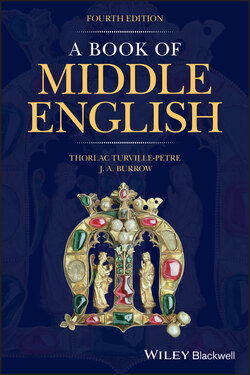Читать книгу A Book of Middle English - J. A. Burrow - Страница 104
Commentary
ОглавлениеThe traditional form of the lullaby, with its sentimental focus on the helpless baby, is in poignant contrast to the grim knowledge of the sufferings this child will undergo, for the baby is Jesus, and the speaker is perhaps gazing at a Christmas crib and reflecting on its significance. As the baby born in a stable, Christ is unkut, ‘not known’; OED uncouth traces the sense development through to its modern sense. Christ will suffer ‘for the thing that was your own’, i.e. mankind, created by God. He is forsake, anticipating his cry at his crucifixion, ‘Why hast thou forsaken me?’ (Matthew 27.46).
In the second stanza the baby is a grom; the modern ‘groom’ is used in a narrower sense. In l. 9 wer is subjunctive in an if clause (5.6.6) where today the indicative would be more usual; in line 10 smerte means ‘painful’; OED smart adj. 10, records the modern sense ‘clever’ from the late sixteenth century, though we still use the verb smart in the sense ‘cause pain’. In the last line blak means ‘pale, pallid’; it is a classic false friend. Its origin is OE blāc; see MED blok. So in some dialects, as here, it has the same spelling as ‘black’ from OE blæc; see MED blak. Very confusing! The final detail, that Christ’s body is ‘dry’, is repeated in Julian of Norwich’s vision of the dead Christ as ‘dry and bloodless’.
